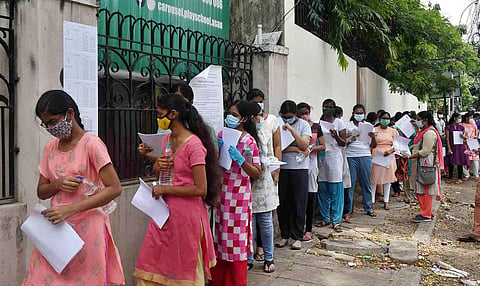

The Madhya Pradesh government issued a notification yesterday, September 13, for implementation of the National Medical Commission’s Bill regarding the fee regulation guidelines, becoming the first state to do so after Tamil Nadu and Kerala. However, activists and experts ponder whether the guidelines will be implemented in reality.
The notification issued by the Directorate of Medical Education, Madhya Pradesh stated that, “This is for information to all National Eligibility Cum Entrance Test Postgraduate (NEET) PG 2022 qualified and eligible candidates who intend to participate in MP State Combined NEET PG counselling 2022, that after removing 15 percent NRI quota seats from the total intake capacity seats of the private medical college, admissions on 42.5 percent of the remaining 85 percent general pool seats shall be at par with the prevailing annual fee of government medical college.
Admission on remaining 42.5 percent seats shall be as per the annual fee fixed by AFC (Admission and Fee Regulatory Committee) or MPPURC (Madhya Pradesh Private University Regulatory Commission).”
To reiterate, the Bill insists that the fee for 50 per cent of seats in private medical colleges and Deemed-to-be Universities must be on par with the fee in government medical colleges in the respective State or Union Territories, according to the memorandum issued in February this year. Dr Meet Ghonia, a health and social activist believes that the Bill could be implemented from next year. “If any private medical colleges association challenges the Bill in the High Court, like it happened in Tamil Nadu and Kerala, it could hamper the implementation process,” he said.
What happened in Tamil Nadu and Kerala?
Groups of private medical colleges challenged the memorandum in the High Courts of both states. “The courts had asked the universities to come with their proposal and these private universities had then said it is not feasible for them to follow a government’s college fees for 50 per cent of their fees,” said Manickavel Arumugam, a NEET expert and Founder of JustGetMBBS.
The only way this could be implemented was if they were to cross-subsidise. “This means that if 50 per cent of the fees were to follow the government college fees, then the remaining 50 per cent of the fees would be doubled. The problem is those 50 per cent of the students will essentially be paying for these candidates’ seats. And the Supreme Court is against this,” Manickavel explained that this point was raised in both the Madras High Court and Kerala High Court.
In fact, the Madras High Court last month, while reserving order on a plea filed by a group of private medical colleges challenging this fee fixation, asked how the Council could charge more fees from 50 per cent of students and less from the other 50 per cent, as stated in a report by LiveLaw.in. It also asked how the system would work if the colleges were not able to fill the remaining 50 per cent seats in the high fees category, the report stated.
Similarly, Advocate Anubha Shrivastava said that these loopholes in the guidelines must be addressed before implementation of the Bill. She pointed out that some universities may not have sufficient funds to run the institute and it would be difficult for them to reduce the fees in such cases.
What can be done instead?
States like Tamil Nadu already have fee regulatory committees in colleges that fix the fee structure, informed Manickavel. “If the government is forcing them to fix it at government college fees then that would be unfair to private colleges,” he said. The NMC instead should come up with guidelines that fix the fees instead of trying to bring them on par with the government fee.
“A proper audit of private institutes must be done to see if some private universities have a huge surplus of funds. If they do, then their fees can be reduced to that of government colleges fees. But if institutes do not have sufficient funding, then the government must provide them with aid,” added Anubha.
